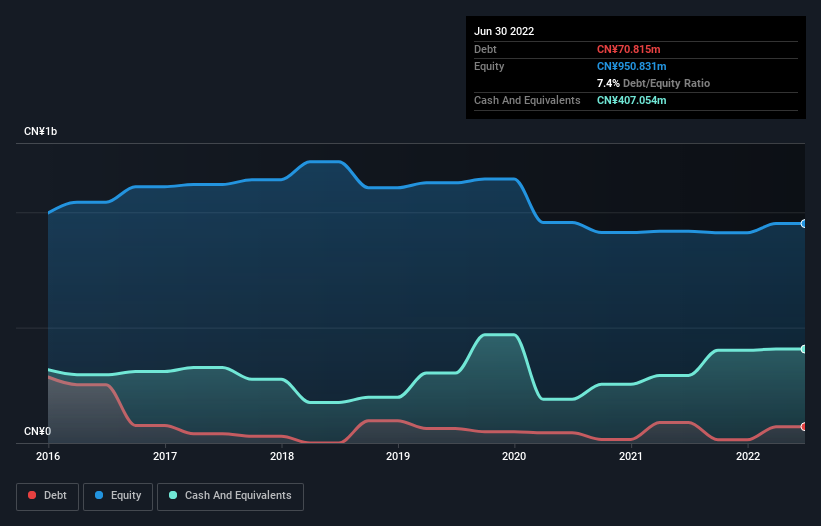- Hong Kong
- /
- Healthcare Services
- /
- SEHK:1345
Shanghai Pioneer Holding (HKG:1345) Seems To Use Debt Rather Sparingly

The external fund manager backed by Berkshire Hathaway's Charlie Munger, Li Lu, makes no bones about it when he says 'The biggest investment risk is not the volatility of prices, but whether you will suffer a permanent loss of capital.' So it seems the smart money knows that debt - which is usually involved in bankruptcies - is a very important factor, when you assess how risky a company is. As with many other companies Shanghai Pioneer Holding Ltd (HKG:1345) makes use of debt. But is this debt a concern to shareholders?
What Risk Does Debt Bring?
Debt assists a business until the business has trouble paying it off, either with new capital or with free cash flow. Ultimately, if the company can't fulfill its legal obligations to repay debt, shareholders could walk away with nothing. While that is not too common, we often do see indebted companies permanently diluting shareholders because lenders force them to raise capital at a distressed price. Of course, plenty of companies use debt to fund growth, without any negative consequences. The first thing to do when considering how much debt a business uses is to look at its cash and debt together.
Check out our latest analysis for Shanghai Pioneer Holding
How Much Debt Does Shanghai Pioneer Holding Carry?
You can click the graphic below for the historical numbers, but it shows that Shanghai Pioneer Holding had CN¥70.8m of debt in June 2022, down from CN¥89.1m, one year before. But on the other hand it also has CN¥407.1m in cash, leading to a CN¥336.2m net cash position.

A Look At Shanghai Pioneer Holding's Liabilities
The latest balance sheet data shows that Shanghai Pioneer Holding had liabilities of CN¥287.7m due within a year, and liabilities of CN¥72.1m falling due after that. On the other hand, it had cash of CN¥407.1m and CN¥260.4m worth of receivables due within a year. So it can boast CN¥307.6m more liquid assets than total liabilities.
This short term liquidity is a sign that Shanghai Pioneer Holding could probably pay off its debt with ease, as its balance sheet is far from stretched. Succinctly put, Shanghai Pioneer Holding boasts net cash, so it's fair to say it does not have a heavy debt load!
In addition to that, we're happy to report that Shanghai Pioneer Holding has boosted its EBIT by 48%, thus reducing the spectre of future debt repayments. The balance sheet is clearly the area to focus on when you are analysing debt. But it is Shanghai Pioneer Holding's earnings that will influence how the balance sheet holds up in the future. So if you're keen to discover more about its earnings, it might be worth checking out this graph of its long term earnings trend.
Finally, a company can only pay off debt with cold hard cash, not accounting profits. While Shanghai Pioneer Holding has net cash on its balance sheet, it's still worth taking a look at its ability to convert earnings before interest and tax (EBIT) to free cash flow, to help us understand how quickly it is building (or eroding) that cash balance. Over the last three years, Shanghai Pioneer Holding recorded free cash flow worth a fulsome 91% of its EBIT, which is stronger than we'd usually expect. That puts it in a very strong position to pay down debt.
Summing Up
While it is always sensible to investigate a company's debt, in this case Shanghai Pioneer Holding has CN¥336.2m in net cash and a decent-looking balance sheet. The cherry on top was that in converted 91% of that EBIT to free cash flow, bringing in CN¥250m. When it comes to Shanghai Pioneer Holding's debt, we sufficiently relaxed that our mind turns to the jacuzzi. The balance sheet is clearly the area to focus on when you are analysing debt. But ultimately, every company can contain risks that exist outside of the balance sheet. We've identified 2 warning signs with Shanghai Pioneer Holding (at least 1 which is a bit concerning) , and understanding them should be part of your investment process.
At the end of the day, it's often better to focus on companies that are free from net debt. You can access our special list of such companies (all with a track record of profit growth). It's free.
New: Manage All Your Stock Portfolios in One Place
We've created the ultimate portfolio companion for stock investors, and it's free.
• Connect an unlimited number of Portfolios and see your total in one currency
• Be alerted to new Warning Signs or Risks via email or mobile
• Track the Fair Value of your stocks
Have feedback on this article? Concerned about the content? Get in touch with us directly. Alternatively, email editorial-team (at) simplywallst.com.
This article by Simply Wall St is general in nature. We provide commentary based on historical data and analyst forecasts only using an unbiased methodology and our articles are not intended to be financial advice. It does not constitute a recommendation to buy or sell any stock, and does not take account of your objectives, or your financial situation. We aim to bring you long-term focused analysis driven by fundamental data. Note that our analysis may not factor in the latest price-sensitive company announcements or qualitative material. Simply Wall St has no position in any stocks mentioned.
About SEHK:1345
Shanghai Pioneer Holding
An investment holding company, engages in marketing, promotion and channel management of pharmaceutical products and medical devices primarily in the People’s Republic of China.
Excellent balance sheet with proven track record.
Market Insights
Community Narratives



